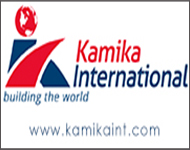Headlines
- Groundbreaking Ceremony Marks Start of Sh50 Billion MTRH Construction Project
- TANROADS-World Bank Alliance Powers Massive Road and Airport Upgrades Across Tanzania
- Kenya Breaks Ground on Sh5 Billion China-Kenya International Commerce Center in Nairobi
- Construction Begins on $2.15 Billion Uvinza–Musongati Railway Project
- Kenya Secures Chinese Funding for Sh5 Billion Nithi Bridge Reconstruction
- Construction Nears for ELCT Facility Backed by Samia’s 250 Million Boost
- KeNHA Kicks Off Construction of Major Kenya-South Sudan Road Project with AfDB Support
- Tanzania Government Allocates 100 Billion Shillings for Bridge Constructions in Lindi
- $46 Million Deal Signed for Crucial Isiolo-Mandera Road Construction Project
- Tanzania Government Set to Sign Agreement for Dodoma Stadium Construction
Kibaki roots for roads upgrade to grow trade within Comesa bloc
 President Kibaki has likened Malawi’s investment in transnational road networks to a policy that he has pursued in the last 10 years as he roots for deeper economic ties between the two countries.
President Kibaki has likened Malawi’s investment in transnational road networks to a policy that he has pursued in the last 10 years as he roots for deeper economic ties between the two countries.More investments in major highways and bypasses to neighbouring countries such as Zambia will reduce the cost of intra-African trade and deepen regional integration, president Kibaki said, shortly after laying the foundation stone for the Lilongwe West By-pass
“This is in line with Comesa master plan for infrastructure development where member countries have committed to developing closer partnerships in the implementation of economic corridors,” a release sent from Lilongwe by the Presidential Press Service quoted President Kibaki as saying Thursday.
In Kenya, a number of major highways that connect the country to export markets in East Africa have either been completed or initiated since Mr Kibaki became President a decade ago.
Main parts of the Mombasa-Malaba route and Thika superhighway that have been completed have significantly cut transport costs to landlocked countries of Uganda, Rwanda, South Sudan and Ethiopia.
Just like Malawi’s road, the African Development Bank has contributed a substantial portion of financing that has put a sheen on Kenyan roads.
Increased investment on infrastructure is just one aspect of bilateral relations that Kenya is seeking to forge with Malawi.
“One of my objectives during this visit to Malawi is to lay the foundation for increased, robust economic and commercial relations between the people of Kenya and Malawi.”
In Lilongwe, Mr Kibaki asked members of Kenya Private Sector Alliance in his entourage led by chairman Patrick Obath to forge close links with their Malawian counterparts in expanding trade.
The two countries belong to the Common Market for Eastern and Southern Africa (Comesa), but have frequently quarrelled over product list.
So far, Kenya has had a positive trade balance with Malawi up to 2011 when imports increased 12 times to Sh6.5 billion, for the first time overtaking exports valued at Sh5.8 billion at the time.
In 2010, Malawi threatened to levy taxes on Kenya’s palm-based cooking oils, saying they did not meet Comesa rules of origin.
On the other hand, Malawi has traditionally provided most of the maize consumed in Kenya until last year when its domestic production began to plummet, forcing exports ban.
“I urge government agencies and business associations in Kenya and Malawi to carry out exchange programmes, trade promotions as well as exhibitions and fairs,” he said.
Source : abdas.org
Posted on : 30 Nov,-0001
Buildmart is Africa's leading directory and market news website for the building and construction industry | Kenya | Tanzania | Rwanda | Ethiopia
Exhibitions In Africa
- 27th Buildexpo Kenya 2026
KICC, Nairobi, kenya
08 - 10, July 2026 - 11th Afriwood Kenya 2026
KICC, Nairobi, kenya
08 - 10, July 2026 - 11th LightExpo Kenya 2026
KICC, Nairobi, kenya
08 - 10, July 2026 - 10th Minexpo Africa 2026
KICC, Nairobi, Kenya
08 - 10, July 2026 - 27th Buildexpo Tanzania 2026
Diamond Jubilee Expo Center, Dar-es-Salaam, Tanzania
23 - 25, Sep 2026 - 10th Afriwood Tanzania 2026
Diamond Jubilee Expo Center, Dar-es-Salaam, Tanzania
23 - 25, Sep 2026 - 10th LightExpo Tanzania 2026
Diamond Jubilee Expo Center, Dar-es-Salaam, Tanzania
23 - 25, Sep 2026 - 10th Minexpo Tanzania 2026
Diamond Jubilee Expo Center, Dar-es-Salaam, Tanzania
28 - 30, Oct 2026





















